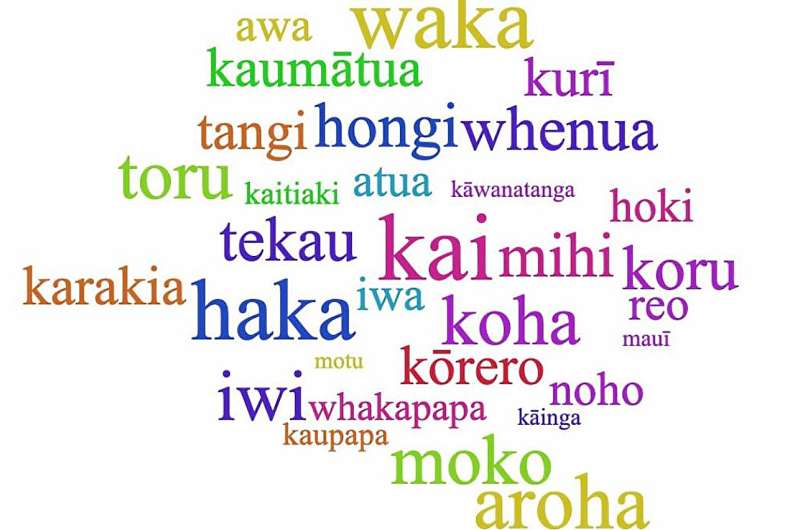Māori words known but not always understood, New Zealand study finds

Non-Māori-speaking New Zealanders can recognize more than 1,000 te reo Māori words or part-words, but only understand meanings of about 70, a new University of Canterbury study shows.
Co-author Professor Jeanette King, from Te Whare Wānanga o Waitaha | University of Canterbury's New Zealand Institute of Language, Brain and Behavior, says the new study, "Assessing the size of non-Māori-speakers' active Māori lexicon," has provided ideas about how "incidental exposure" to language is helpful for anyone who wants to learn a language.
"The government's aim is for 1 million New Zealanders to be able to speak te reo by 2040. This body of research helps us understand what our baseline understanding is now for non-Māori-speakers. It has provided information about the Māori proto-lexicon—the words we don't even know we know," Professor King says.
"It initially came about because a couple of University of Canterbury linguistics lecturers were listening to their preschoolers chatting and singing in the backseat after picking them up from preschool. They were singing Māori songs, using the right sound patterns but making up the words. For instance, Māori words never end in a consonant and their mimicking showed they had understood that—they understood what we call phonotactic sound patterns," she says.
"And so, the lecturers thought, 'if children are picking up this knowledge about the Māori language sound system, what about adults?'"
When they started to research the topic, they found that most New Zealanders not only have great understanding of Māori sounds, but they also subconsciously recognize a lot of words.
"Teachers of second languages advise you to have movies with the language you want to learn on in the background as you go about your day. The more you can build up sound patterns and word knowledge, it's going to be helpful. By understanding that people already have a knowledge of Māori sound patterns and words, we're hoping that will encourage more people to learn Māori."
The findings support events such as Māori Language Week, the use of bilingual road signs and increased use of te reo Māori in public places.
"Our newest findings show that people really can't define these words that they subconsciously recognize. Non-Māori-speaking New Zealanders have a considerable knowledge about a word before they know its actual meaning."
The research paper, published in the journal PLOS One, will be of interest to academics worldwide, Professor King says.
"New Zealand is the perfect place to study the proto-lexicon, with only one Indigenous language and reasonably strong 'incidental' exposure to the language. The status of the language here and promotion of Māori language also play a part."
A proto-lexicon is the type of word knowledge where you know the form of the word but not its meaning. The proto-lexicon is an important part of the process by which infants acquire language. That is, through repeated exposure to running speech, infants gradually learn to separate words from strings of sound and then begin to attach meanings to these words.
The research team has taken their commitment a step further and are all on their journey to learn te reo Māori.
"We have a responsibility as New Zealanders to see that Māori language flourishes. It's part of not just taking language for granted. It feels important and appropriate, and of course being based in a university, we have good access to Māori language courses."
More information: Yoon Mi Oh et al, Assessing the size of non-Māori-speakers' active Māori lexicon, PLOS ONE (2023).
Journal information: PLoS ONE
Provided by University of Canterbury




















